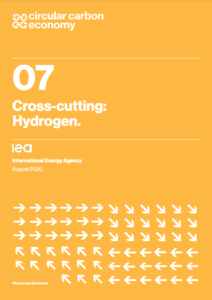Full Title: Cross-Cutting: Hydrogen
Author(s): Taku Hasegawa, Uwe Remme
Publisher(s): International Energy Agency (IEA)
Publication Date: August 28, 2020
Full Text: Download Resource
Description (excerpt):
Hydrogen is enjoying unprecedented momentum across the world. This is raising expectations that it may finally meet its longstanding promise of making a substantial contribution to a lower-carbon energy future, as envisaged in many countries. Tremendous interest is growing among governments, industry and other stakeholders, who consider hydrogen to be a fundamental piece of a clean, secure and affordable energy system.
Adopting a new clean fuel like low-carbon hydrogen is a challenging endeavor that has to overcome significant barriers beyond economics. The need for hydrogen infrastructure is a bottleneck preventing widespread adoption. It can be overcome by using existing infrastructure that is compatible with hydrogen (such as parts of the natural gas grid) and developing new sector-specific infrastructure (like hydrogen refueling stations for road transport). Numerous regulations represent another significant barrier that limits the development of a clean hydrogen industry. New and updated standards coordinated between countries would help overcome this barrier, facilitating international trade in hydrogen and the development and commercialization of hydrogen-based end-use technologies.
In addition, the accounting and verification of CO2 emissions savings requires a robust methodology with certified standards to provide clarity to stakeholders and avoid double counting. Other barriers, such as social acceptance, potential environmental impacts and the availability of a specialized workforce, may be perceived as minor issues at times, but they can turn into major obstacles for achieving large-scale deployment of hydrogen technologies. Anticipating these barriers and adopting measures early to overcome them will help avoid problems in the future
